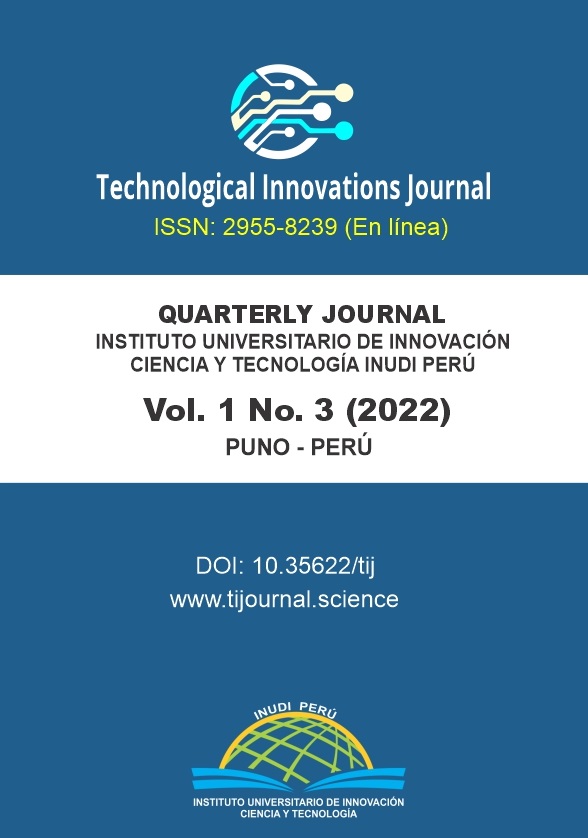Pandemic reflections in higher education: theoretical review of work stress in the teaching role
DOI:
https://doi.org/10.35622/j.ti.2022.03.004Keywords:
pandemic, physical and mental health, teaching stressors, virtual education, burnoutAbstract
The pandemic evidenced the low level of quality of the educational system in Peru and the effects on mental and physical health, related to stress on teachers within the context of virtual higher education. The objective of this research was to analyze the main theoretical contributions of work stress in teachers in the context of a pandemic. For the analysis, the qualitative method and documentary-type design were used, collecting and reviewing scientific sources related to the subject within the period that the confinement lasted. This made it possible to understand that the main theoretical contributions were related to work stress within distance education, internal and external factors that promote stress, burnout syndrome and techno-stress, factors for which teachers were not prepared. Faced with this situation, the lack of connectivity and the implementation of state-of-the-art digital equipment were added. It was then possible to conclude the importance of the integral well-being of the teacher and the balance of the internal and external factors that determine stress, to ensure their adequate work performance within the context of the virtuality that the pandemic brought.
References
Andrade Chauvin, W. L. (2021). El estrés y el consumo de alcohol durante la pandemia de la Covid-19. Revista Científica Retos de la Ciencia., 5(11), 13-24. https://retosdelacienciaec.com/Revistas/index.php/retos/article/view/352/387 DOI: https://doi.org/10.53877/rc.5.11.20210701.0
Arias, F. (2012). El Proyecto de Investigación. Episteme.
Balluerka, N., Gómez, J., Hidalgo, D., Gorostiaga, A., Espada, J., Padilla, J., & Santed, M. (2020, Mayo). Las consecuencias psicológicas de la covid-19 y el confinamiento. Universidad del País Vasco. https://www.siis.net/documentos/ficha/551534.pdf
Brennan, F. (2021, Enero). Technostress and Leadership: A case study in higher education during the COVID-19 crisis. https://cutt.ly/GBpD2t7
Cannon, W. B. (2012). Biología del Comportamiento - Estrés. Facultad de Psicología - UBA. Retrieved March 15, 2022. https://cutt.ly/nBpDB4V
Casali, A., & Torres, D. (2021). mpacto del COVID 19 en docentes universitarios argentinos: cambio de prácticas, dificultades y aumento del estrés. evista Iberoamericana de Tecnología en Educación y Educación en Tecnología,, 1(28), 423-431. https://teyet-revista.info.unlp.edu.ar/TEyET/article/view/1531/1408 DOI: https://doi.org/10.24215/18509959.28.e53
Castillo, L. (2020). Lo que la pandemia nos enseñó sobre la educación a distancia. Revista Latinoamericana de Estudios Educativos, 50(Especial), 343–352. https://rlee.ibero.mx/index.php/rlee/article/view/119/492 DOI: https://doi.org/10.48102/rlee.2020.50.ESPECIAL.119
Cevallos, A., Mena, P., & Reyes, E. (2021). Salud mental docente en tiempos de pandemia por covid-19. Revista Investigación y desarrollo, 14(1), 132-138. https://revistas.uta.edu.ec/erevista/index.php/dide/article/view/1334/1110 DOI: https://doi.org/10.31243/id.v14.2021.1334
Christian, M., Purwanto, E., & Wibowo, S. (2020, Julio). Technostress Creators on Teaching Performance of Private Universities in Jakarta During Covid-19 Pandemic. Technology Reports of Kansai University, 62(06), 2805. https://cutt.ly/lBpDZG0
Cortes, J. L. (2021). El estrés docente en tiempos de pandemia. Dilemas contemporáneos: educación, política y valores, 6(Edición especial), 1 -11. https://cutt.ly/7BpDHY7
De Arco, L. K., & Castillo, J. A. (2020). Síndrome de Burnout en época de pandemia: caso colombiano. interconectando Saberes, (10), 10. https://is.uv.mx/index.php/IS/article/view/2675
Diaz, S. (2020). El estrés laboral docente durante COVID-19. ACSI Latinoamérica. https://cutt.ly/kBpDAs7
Dos Santos, G. M. F., & Da Silva, M. E. (2021). COVID-19 Emergency remote teaching and university professors' mental health. RBSMI (REVISTA BRASILEIRA DE SAUDE MATERNO INFANTIL, 21(1). https://www.scielo.br/j/rbsmi/a/b3TVbVHcCZRxkVZPFPK6PHF/?lang=en DOI: https://doi.org/10.1590/1806-9304202100s100013
Etxebarria, N. O., & Santamaria, M. D. (2020). Niveles de estrés, ansiedad y depresión en la primera fase del brote del COVID-19 en una muestra recogida en el norte de España. Cad. Saúde Pública, 36(4). https://www.scielo.br/j/csp/a/bnNQf4rdcMNpPjgfnpWPQzr/?lang=en&format=html
Exposito, C., & Marsollie, R. (2021). Percepción docente de las habilidades del sistema educativo en el regreso a la presencialidad. Un estudio cualitativo en tiempos de Covid - 19. Revista Educación Las Américas, 11(1), 1-23. https://doi.org/10.35811/rea.v11i1.136 DOI: https://doi.org/10.35811/rea.v11i1.136
Flores, A., Coila, D., Ccopa, S., Yapuchura, C., & Pino, Y. (2021, Setiembre 15). Actividad física, estrés y su relación con el índice de masa corporal en docentes universitarios en pandemia, 12(3), 175-185. https://doi.org/10.33595/2226-1478.12.3.528 DOI: https://doi.org/10.33595/2226-1478.12.3.528
Gallo, C. (2020, September 11). Estudios muestran que la pandemia y el confinamiento han afectado la salud mental de la población. France 24. Retrieved March 10, 2022, from https://www.france24.com/es/20200911-impacto-pandemia-salud-mental
Gonzales, N. (2008). Prevalencia del estres en la satisfaccion laboral de los docentes universitarios. Instituto de Tecnologia Maracaibo, 4(3), 68-89. https://cutt.ly/FBpDEVc
Koch, S. E. (. (2021). Teachers Coping with Technostress in Online Vocational Education pandemic on technostress among Menoufia University Staff, Egypt: a cross-sectional study. In University of Groningen. University of Groningen. https://cutt.ly/ABpDb9f
Li, L., & Wang, &. X. (2020, Febrero 15). Technostress inhibitors and creators and their impacts on university teachers’ work performance in higher education. Cognition Technology and Work, 23(2), 64. 10.1007/s10111-020-00625-0 DOI: https://doi.org/10.1007/s10111-020-00625-0
Mateus, J. C., & Andrada, P. (2022). Perpectivas docentes para una agenda critica en educacion mediatica post Covid - 19. Estudio comparativo en Latinoamerica. Revista Cientifica de Educomunicacion, 30(70). DOI: https://doi.org/10.3916/C70-2022-01
Mena Miranda, L. (2010, Junio 07). El desgaste profesional en profesores universitarios: un modelo predictivo. Digibug. https://digibug.ugr.es/handle/10481/5531
Mendes Rodriges, L. T. (2019). Estres y depresion en docentes de una institucion publica de enseñanza. Enfermeria Global, 19(1), 209 -220. https://revistas.um.es/eglobal/article/view/383201
Muñoz Chavez, J.P., & García Contreras, R. (2022). Burnout y educación en línea: adaptación y validación de escala durante la pandemia. TELOS:Revista de estudios interdisciplinarios en ciencias sociales, 24, 39. http://ojs.urbe.edu/index.php/telos/article/view/3535/4950 DOI: https://doi.org/10.36390/telos241.03
OCDE. (2020). El impacto del COVID-19 en la educación – Información del Panorama de la Educación (Education at a Glance) 2020. OECD. Retrieved Marzo 9, 2022, from https://www.oecd.org/centrodemexico/medios/EAG2020_COVID%20Brochure%20ES.pdf
Organización Panamericana de la Salud. (2020). Salud Mental y COVID-19 - OPS/OMS | Organización Panamericana de la Salud. PAHO. Retrieved March 11, 2022. https://www.paho.org/es/salud-mental-covid-19
Oros, L. B., Vargas, N., & Chemisquy, S. (2020). Estresores docentes en tiempos de pandemia: Un instrumento para su exploración. Revista Interamericana de Psicología/Interamerican Journal of Psychology, 54(3), 1-29. 10.30849/ripijp.v54i3.1421 DOI: https://doi.org/10.30849/ripijp.v54i3.1421
Ozamiz Etxebarria, N., Dosil Santamaria, M., Picaza Gorrochategui, M., & Idoiaga Mondragon, N. (2020). Stress, anxiety, and depression levels in the initial stage of the COVID-19 outbreak in a population sample in the northern Spain. Cad. Saúde Pública, 36(4), 7. https://cutt.ly/UBpDkwm DOI: https://doi.org/10.1590/0102-311x00054020
Penado Abilleira, M., Rodicio García, M. L., Ríos de Deus, M. P., & Mosquera González, M. J. (2021, Febrero 25). Technostress in Spanish University Teachers During the COVID-19 Pandemic. Frontiers in Education, 12(617650), 8. 10.3389/fpsyg.2021.617650
Penado Abilleira, M., Rodicio-García, M. L., Ríos-de Deus, M. P., & Mosquera-González, M. J. (2021, febrero 25). Technostress in Spanish University Teachers During the COVID-19 Pandemic. Frontiers in Education, 1. 10.3389/fpsyg.2021.617650 DOI: https://doi.org/10.3389/fpsyg.2021.617650
Riveiro, M. (2021). Ansiedad, afecto negativo y estrés de docentes en actividad remota durante la pandemia de COVID - 19. TES trabajo educación y salud, 19(19), 1 - 20. DOI: https://doi.org/10.15359/mhs.19-2.6
Robinet, A., & Pérez, M. (2020). Estrés en los docentes en tiempos de pandemia Covid-19. Polo del conocimiento, 5(12), 637-653. https://cutt.ly/tBpDfQv
Rodriguez, J. (2008). Estrés laboral, liderazgo y salud ocupacional. Papeles del Psicólogo, 29(1), 68-82. https://www.redalyc.org/pdf/778/77829109.pdf
Rodríguez-Vásquez, D. J., Totolhua-Reyes, B. A., Domínguez- Torres, L., Rojas-Solís, J. L., & De La Rosa-Díaz, B. E. (2021). Tecnoestrés: Un análisis descriptivo en docentes universitarios durante la contingencia sanitaria por COVID-19 (Technostress: An exploratory study in university professors during the health contingency due to COVID-19). Enseñanza en Investigación en Psicología, 3(2), 225-237. https://www.aacademica.org/dr.jose.luis.rojas.solis/72
Serpa, A. V., & Alvarez Vaca, M. V. (2014). Estrés laboral, síndrome de Burnout y técnicas de afrontamiento en docentes de educación general básica de un colegio privado de Quito en el periodo Marzo a Julio del 2013. Repositorio de la Universidad Internacional SEK Ecuado, 1 -113. https://repositorio.uisek.edu.ec/handle/123456789/894
Shlenskaya, N., & Karnaukhova, A. (2020). Teachers’ Burnout in Online University Courses in the Time of Pandemic. ICEMT 2020: 2020 The 4th International Conference on Education and Multimedia Technology, (95 -99). https://dl.acm.org/doi/abs/10.1145/3416797.3416841 DOI: https://doi.org/10.1145/3416797.3416841
Sokal, L. J., Eblie Trudel, L. G., & Babb, J. C. (2020, Agosto 11). Supporting Teachers in Times of Change: The Job Demands- Resources Model and Teacher Burnout During the COVID-19 Pandemic. International Journal of Contemporary Education, 3(2), 70-72. https://winnspace.uwinnipeg.ca/handle/10680/1823 DOI: https://doi.org/10.11114/ijce.v3i2.4931
Tagurum, Y., Okonoda, K., Miner, C., Bello, D., & Tagurum, D. (2017, junio 06). Effect of technostress on job performance and coping strategies among academic staff of a tertiary institution in north-central Nigeria. International Journal of Biomedical Research, 8(6), 313. http://ssjournals.com/index.php/ijbr
Troitinho, M. d. C. R., Brelaz da Silva, I., Sousa, M. M., da Silva Santos, A. D., & Maximino, C. (2021). Ansiedade, afeto negativo e estresse de docentes em atividade remota durante a pandemia da Covid-19. Trab. Educ. Saúde, 19(e00331162), 1-20. https://doi.org/10.1590/1981-7746-sol00331 DOI: https://doi.org/10.1590/1981-7746-sol00331
Vilchez, J., Humire, D., & Gabriel, T. (2021). Estrés laboral y síndrome de burnout durante la pandemia en docentes de una asociación educativa peruana. UCV HACER Revista de Investigación y Cultura - Universidad César Vallejo, 10(4), 45-52. https://cutt.ly/FBpDwIv
Vílchez Julon, J., Humpire Molina, D. J., & Gabriel Pérez, T. (2021). strés laboral y síndrome de burnout durante la pandemia en docentes de una asociación educativa peruana. Revista de Investigación y Cultura -Universidad César Vallejo, 10(4), 1-8. https://cutt.ly/kBpS7gH DOI: https://doi.org/10.18050/RevUCVHACER.v10n4a4
Weibenfels, M., Klopp, E., & Perels, F. (2022). Changes in Teacher Burnout and Self-Efficacy During the COVID-19 Pandemic: Interrelations and e-Learning Variables Related to Change. Frontiers in Education, 6. https://www.frontiersin.org/articles/10.3389/feduc.2021.736992/full DOI: https://doi.org/10.3389/feduc.2021.736992
Yadav, A., & Rahaman, A. (2020, noviembre 10). Technostress Level of Teachers in Higher Education with Reference to Socio- Demographic Variables: Aarti Yadav Ataur Rahaman. International journal of advances in engineering and technology, 9(2), 64. https://cutt.ly/SBpS1mF DOI: https://doi.org/10.3126/mjmms.v1i2.46498
Published
Issue
Section
License
Copyright (c) 2022 Gabriela Manzur-Vera, Cynthia Rodriguez, Maria Vargas, Karla Tapia (Autor/a)

This work is licensed under a Creative Commons Attribution 4.0 International License.











